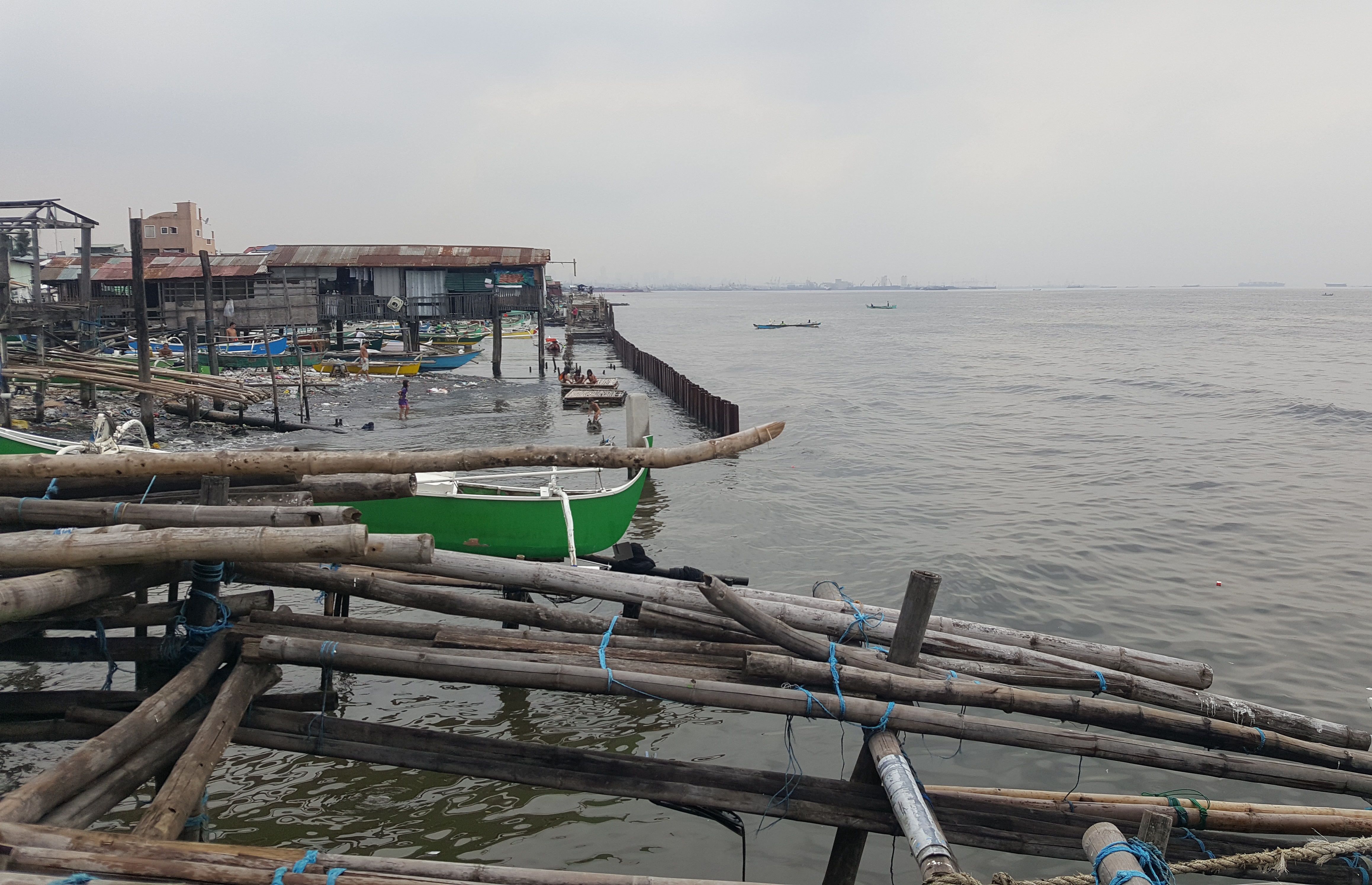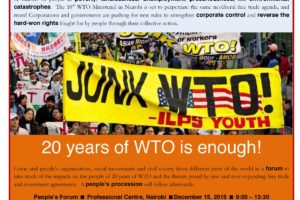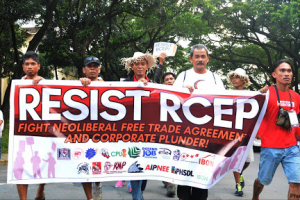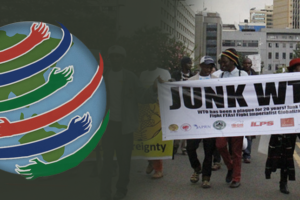Background: Trade and Development
In asking whom development serves, we question whether policies like free trade and development projects actually benefit all citizens equally. The World Trade Organization (WTO) has been advocating for free trade policies that can put developing countries at a disadvantage. As members of the WTO, these countries agree to open up their resources and economies, privatize their social services, and allow less oversight of foreign corporate investments in development projects. These policies have contributed to the rise of global inequality. While developing countries seemingly benefit from trading with developed countries like the United States, WTO’s current trade policies direct profits towards wealthy corporations and stakeholders rather than a country’s poorest citizens.
The Philippines has been a member of the WTO since 1995, which has led to the Philippines transforming from a net exporter into a net importer despite an abundance of natural resources. Specifically, the value of fishery exports in the Philippines has decreased from almost 70 billion pesos in 2013 to about 30 billion pesos in 2015.[i] While the value of exports have decreased, the value of imports increased from less than 10 billion pesos in 2013 to almost 15 billion pesos in 2015.[ii]This feature article will outline the impact of free trade agreements (FTAs), international policies, and local Philippine laws on small fisherfolk in Manila Bay.
Navotas as the Fishing Capital of the Philippines
[[{“type”:”media”,”view_mode”:”media_original”,”fid”:”1796″,”attributes”:{“alt”:””,”class”:”media-image”,”height”:”2988″,”style”:”font-size: 12px; width: 600px; height: 387px;”,”typeof”:”foaf:Image”,”width”:”4634″}}]]
Navotas and Manila Bay. Photo courtesy of Michelle Gan, 2017.
The Philippines is one of the leading fish producers in the world, providing 3.1 million tonnes of fish and other aquatic animals in 2012.[iii] The fisheries and aquaculture industry employs approximately 1.5 million people throughout the country. In 2012, the Philippine fishing industry contributed an estimated 1.8%, or 196 billion pesos, to the country’s gross domestic product (GDP).[iv] Tuna, shrimp, and prawns are the top marine exports.[v]
Navotas, a city of about 250,000 people in northern Metro Manila, is known as the Fishing Capital of the Philippines.[vi] Approximately 70% of the population derives their livelihood from fishing and related industries.[vii] Municipal fisheries production in Navotas consistently contributes 55 to 60% share of the Philippines’ annual fish production, although the total production has quadrupled since 1977.[viii] Navotas is also home to the second largest fish port in the country, the Navotas Fish Port Complex.[ix]
Yet, for being home to a 107.8 billion-peso industry in which 70% of residents partake, 38%, or 15,904, of Navotas households belong to the urban poor.[x]The average family income per year is P60,000 for an average family size of 4.65 with the income per capita of P12,903.22.[xi] Barangay Tangos is one such community of urban poor fisherfolk communities in Navotas, who rely on the Manila Bay to earn a living. Despite their coastal location, many of Tangos’ 33,211 residents do not share in the profits of the fishing industry in the same ways that commercial fishing corporations do. Barangay Tangos is comprised of small fisherfolk with small boats, locally known as bangka, who face challenges when competing with larger commercial fishing vessels.
The proliferation of laws from the Navotas government that increasingly regulate where and how fisherfolk can fish, coupled with rising pollution of the Manila Bay, make it more difficult for the Tangos fisherfolk to catch enough fish to sustain themselves and their families. Less than 10 kilometers away from Tangos is one of three landfills for all the garbage in Metro Manila. The landfill has received 1200 truckloads of garbage a day for the last ten years, contributing to the death of nearby mangroves and damaging the marine ecosystems. Fisherfolk within the community report that their average daily catch has dropped from a minimum of 10 to 15 kilos in 1981 to barely 2 to 3 kilos today. Fisherfolk discuss laws that dictate where they can fish, such as one that prohibits fishing “beyond 15 kilometers (of the bay) from the shoreline.”[xii] Such a restriction makes virtually most, if not all, of Manila Bay unviable fishing grounds due to the fact that the shoreline of each coastal area overlaps with other coastlines. Additionally, municipalities throughout Metro Manila have passed laws requiring fisherfolk to only fish in their cities: i.e. Navotas fisherfolk cannot fish in parts of Manila Bay designated as belonging to Malabon. Otherwise they face a 100,000 peso penalty. If they want to fish in different municipalities, fisherfolk need permits that are too expensive for fisherfolk who often go hungry to feed their families.
These laws compel many Tangos fisherfolk not to go out on the water at all, knowing that their catch will not compensate for potential fines or even their daily expenses like gas and food. As the fish in the Manila Bay have dwindled, many fisherfolk go the eight hours of fishing on the sea without any food at all, preferring to use that money for food for their families instead. Even without the fines, fisherfolk have been struggling to earn a daily catch that allows them to break even. One fisherman interviewed caught nine baskets of fish, worth 146 pesos each, for a total of 1,314 pesos. His expenses amounted to 470 pesos for gas and lunch. He needed to split his profit, 844 pesos, four ways to pay the two fishermen who helped him earn his daily catch and the person’s boat he used to catch the fish since he does not own one, leaving only 211 pesos for himself. That 211 pesos is then meant to feed a family of three and cover expenses like rice, water, and electricity, leaving little for his children’s education or other expenses.
[[{“type”:”media”,”view_mode”:”media_original”,”fid”:”1803″,”attributes”:{“alt”:””,”class”:”media-image”,”height”:”2000″,”style”:”font-size: 12px; width: 600px; height: 1500px;”,”typeof”:”foaf:Image”,”width”:”800″}}]]
Thus, while the Philippines relies heavily on its fishing industry and Navotas contributes significantly to that industry, residents of Tangos do not reap the economic benefits of the industry’s growth. Instead, these small fisherfolk find that government policies around fishing and environmental pollution have made it harder for Tangos residents to make ends meet, let alone earn enough to achieve social mobility.
Manila Bay Reclamation: Private Profit Over Community Needs
With Navotas being an integral part of Manila Bay, it leaves the municipality vulnerable to government development projects that are focused on the bay as prime real estate. These so-called reclamation projects are, on paper, seen as pathways for Philippine economic success, and involve the construction of new malls and business parks as a means of invigorating the tourism industry and bringing more foreign investment.[xiii] In reality, these reclamation projects displace thousands of homes, families, and communities and increase the inequality between the Philippines’ rich and poor.
A reclamation project is a government-approved project that creates new land by dumping sand into different parts of Manila Bay, as a means of expanding the city to create new properties.[xiv] The Philippine Reclamation Authority (PRA) is the government agency responsible for approving these projects, having approved over 100 projects in the last 10 years. These projects are located mostly in Manila Bay, such as the construction of the Mall of Asia (MOA) in 2006. While many people perceive the MOA as a successful venture because of high revenue, few know about the 37,000 people displaced as a result of MOA.[xv] The main developer behind MOA, SM and its extremely wealthy owner, Henry Sy, did little to consult with affected communities, particularly fisherfolk. Not only were thousands of fisherfolk displaced from their homes, they were also displaced from their fishing grounds and the entire livelihood of the local community was negatively impacted by a project that was not meant for them. This disruption of people’s livelihoods begs the question of why these reclamation projects even exist, and who’s benefiting from them.
These reclamation projects affect all citizens of Manila for environmental and heritage reasons, but fisherfolk are some of the most disproportionately affected. The reclamation of land in Manila Bay displaces not only fishers, but also the fish themselves. In the case of MOA, not only were the fisherfolk displaced, but the fish they used to catch in Manila Bay have also been displaced. This loss of catch has been one of many examples of the environmental impact of reclamation projects, specifically the potential impact on marine life and on the ecological systems in Manila Bay. Thus, reclamation projects threaten fisherfolks’ livelihoods and homes.
In the years since MOA, the PRA has come out with the National Reclamation Plan, a list of eleven proposed reclamation projects in Manila Bay. The 650 hectares between the Navotas Fishing Port to Barangay Tangos that comprise the Navotas Boulevard Business Project (NBBP), or the North Bay Business Project, is one such project.[xvi] The NBBP currently possesses a significant detrimental impact to the Tangos community. This majority fishing community is not only expected to uproot themselves from their homes, but as the project is being constructed, they are physically blocked from fishing by the creation of a new wall on the shoreline. The people of Tangos were not consulted in the approval of this project, nor were environmentalists consulted on the effect on local marine life. This project will effectively displace 20,000 fisherfolk and more urban poor families from Navotas for a mall and business park.[xvii] Tangos is currently government-owned land, meaning the fisherfolk and other communities living there do not have to pay rent. It also means that those with land deeds are forced to vacate the land because the reclamation is government-sponsored. These fisherfolk are uprooted from their homes and livelihoods without any potential economic means or support to move, all for the sake of profitable real estate.
Underlying Factors: Issues of Development
[[{“type”:”media”,”view_mode”:”media_original”,”fid”:”1800″,”attributes”:{“alt”:””,”class”:”media-image”,”height”:”341″,”style”:”width: 600px; height: 258px;”,”typeof”:”foaf:Image”,”width”:”792″}}]]
Photo courtesy of Michelle Gan, 2017.
While the reclamation of Manila Bay requires government approval, corporations and investors interested in investing in Manila Bay real estate carry out the actual project. One developer in particular, Manila Gold Coast Corporation, has been driving development in Manila Bay. After seeking approval for the reclamation projects since the early 1990s, Manila Gold Coast finally succeeded in 2011.[xviii] This corporation and its shareholders have connections to different multinational corporations centered around infrastructure development and to foreign investors, as well as involvements in real estate development projects that are on former US military bases.[xix] It seems like these types of developers and partnerships between the government and private firms are geared towards a vision of development for the Philippines that does not actually include the people or local communities most affected.
As a member of the WTO, the Philippines has agreed to allow development projects like these to be funded by foreign investors with up to 40% equity.[xx] WTO membership requires the Philippines to accept certain conditions that allow for less oversight of corporate projects and an opening up of their economy to foreign investors. Opening up the economy means that the Philippines can no longer favor local investors or corporations, making it easier for foreign firms to invest. WTO membership and its conditions can lead to free trade deals and other similar agreements that are made between countries and firms without giving the people, especially marginalized communities in developing countries, a seat at the table.[xxi] It allows for projects like the reclamation project to proceed without any community consultation. Reclamation projects like the one in Navotas raise important questions about how policy, particularly in trade and investment in developing countries, and development projects should require the inclusion of voices of the people in decision-making. Without an opportunity to influence policies that affect them, the communities will always hotly contest these deals, agreements, and projects.
The Resistance of Barangay Tangos
Despite Navotas government attempts to displace Tangos residents, the local fisherfolk community has organized to resist these efforts as well as fight for their right to a livelihood through fishing. These small fisherfolk work through organizations like Pamalakaya, the National Federation of Small Fisherfolk Organizations in the Philippines. Founded in 1987, Pamalakaya is an alliance of activist fisherfolk groups in the country with over 100,000 individual members and 43 provincial chapters. Pamalakaya is also a member of the largest international organization of small fisherfolk, the World Forum of Fisher People (WFFP), and the International Fisherfolk and Fishworkers’ Coalition. Pamalakaya engages in protests on the local and national level, by utilizing tactics such as local community dialogues, direct actions addressed to local government and national agencies, dialogues with policymakers, and petition drives.
Leaders within local fisherfolks’ organizations in Tangos described how their community has organized to successfully apply pressure on government policies and corporate projects that threaten their livelihood. For example, the Tangos fisherfolk community managed to halt the ongoing construction of the NBBP’s wall a couple of kilometers from the coastline. The three-year long reclamation project was stopped and the wall left incomplete as a result of significant protests and organizing from local fisherfolks. They blocked construction and conducted dialogues with nongovernmental organizations and the National Bureau of Fisheries. Even as they lobbied the government, they recognized the need for other forms of resistance and that they could not wait for the government to make concessions without applying pressure. The wall’s presence has made it more dangerous for fisherfolk, amplifying the strength of the waves after they bounce back from the wall. One fisherman’s boat shattered after the waves pulled his boat towards the wall for a collision that ruined his ability to earn a living.
Currently, the local fisherfolks are organizing for a return to free and communal fishing. They reject laws like Republic Act 10654 that amended the Philippine Fisheries Code to prohibit fishing beyond 15 kilometers from the shoreline. One community leader specifically cited a recent July 4 dialogue with lawyers at the Bureau of Fisheries who maintained that they were only upholding the law that had been passed and had no power to change things. One chairman of a local fisherfolk organization said they need rallies to demonstrate the support of the people of the city. Specifically recognizing that even though a law has been passed, if it is unjust, then they needed to call for the repeal of such a law that further marginalizes local communities.
In fact, because the law is not on your side, one always has to be strategizing and organizing cross-sector alliances. In the case of small fisherfolk, their organizing has grown to include outreach to workers who will be affected by displacement, wealthier owners of trawls who also struggle because of increased regulations, and others whose lives are related to the struggles of small fisherfolk. They organized themselves into an alliance called Kontra Konversion Koalisyon Reclamation, or KKKR. Media has also served as a powerful tool to promote awareness of the issues they face and mobilize people to join.
Continuing the Fight For Manila Bay
Local laws like RA 10654 amended the 1998 Fisheries Code purportedly to protect the ocean and address the poverty of small fisherfolk. Yet, because lawmakers fail to consult the affected communities they claim to help, these laws do more harm than good. They restrict small fisherfolks’ ability to earn a sustainable livelihood, and point to the need for inclusive decision-making. Legislators approve reclamation projects and free trade agreements with other countries in the name of promoting economic growth for the Philippines. However, these laws have only increased the gap between the rich and the poor, demonstrating that all citizens do not equally share the benefits of this so-called growth.
This growing inequality indicates the need for people-based laws and agreements. The Philippine government needs to advocate for the rights of all its citizens. This means representing not just those who profit from the presence of more malls and luxury hotels, but also those displaced by said malls. Only people-based policies that elevate the voice of affected communities throughout the decision-making process can address these inequities.
Member nations like the Philippines must engage in community-informed policymaking during the upcoming WTO Ministerial Conference in Buenos Aires in December 2017, especially during negotiations concerning fishing subsidies. These subsidies are nominally designed to tackle overfishing and stop illegal, unreported, and unregulated fishing (IUU). However, these subsidies are instead given to commercial fishers, who still engage in IUU to compete on the foreign market. Current WTO proposals for the conference suggest eliminating these seemingly ineffective subsidies to better promote trade liberalization among WTO members. Rather than eliminating subsidies altogether, however, the subsidies should be revised and redirected towards the development of small fisherfolk and the modernization of their practices and tools. According to the Bureau of Fisheries and Aquatic Resources, only 32% of Filipino fisherfolk on a municipal level owns mechanized boats with only 3-16 horsepower.[xxii] 68% still use less technologically advanced fishing gear like paddleboats and fishing rods, while some do not own any fishing gear at all. Instead of favoring wealthy fishing industries in the Global North with these trade liberalization proposals, the developing country governments should use subsidies and other supports to assist tangible development in communities like Tangos. It is time to stop the cycle of creating global agreements without the input of local communities.
*Michelle Gan and Margaret Von Rotz, students at University of Chicago and University of California, Los Angeles, respectively, are currently on a two-month internship (July-August 2017) at IBON International as fellows of Kaya Collaborative.
[i] “Fisheries Statistics of the Philippines.” Philippines Statistics Authority. October 2016. Accessed August 2017. https://psa.gov.ph/sites/default/files/FStatPhil13-15docx.pdf.
[ii] “Fisheries Statistics of the Philippines.” Philippines Statistics Authority. October 2016. Accessed August 2017. https://psa.gov.ph/sites/default/files/FStatPhil13-15docx.pdf.
[iii]"FAO Fisheries Statistics." Food and Agriculture Organization of the United Nations: Fisheries and Aquaculture. May 2014. Accessed July 2017. http://www.fao.org/fishery/facp/PHL/en#CountrySector-Statistics .
[iv]"FAO Fisheries Statistics." Food and Agriculture Organization of the United Nations: Fisheries and Aquaculture. May 2014. Accessed July 2017. http://www.fao.org/fishery/facp/PHL/en#CountrySector-Statistics .
[v]"Population of the National Capital Region." Philippine Statistics Authority. May 31, 2016. Accessed July 2017. https://psa.gov.ph/content/population-national-capital-region-based-2015-census-population-0.
[vi]Lumaque, Leonard. "Navotas: Sharing Their Fishing Culture." DSLU Research Congress. March 2, 2015. Accessed July 2017. http://www.dlsu.edu.ph/conferences/dlsu_research_congress/2015/proceedings/LCCS/002LCS_Lumaque_LBL.pdf.
[vii]"FAO Fisheries Statistics." Food and Agriculture Organization of the United Nations: Fisheries and Aquaculture. May 2014. Accessed July 2017. http://www.fao.org/fishery/facp/PHL/en#CountrySector-Statistics .
[viii]Lumaque, Leonard. "Navotas: Sharing Their Fishing Culture." DSLU Research Congress. March 2, 2015. Accessed July 2017. http://www.dlsu.edu.ph/conferences/dlsu_research_congress/2015/proceedings/LCCS/002LCS_Lumaque_LBL.pdf.
[ix]Lumaque, Leonard. "Navotas: Sharing Their Fishing Culture." DSLU Research Congress. March 2, 2015. Accessed July 2017. http://www.dlsu.edu.ph/conferences/dlsu_research_congress/2015/proceedings/LCCS/002LCS_Lumaque_LBL.pdf.
[x]Lumaque, Leonard. "Navotas: Sharing Their Fishing Culture." DSLU Research Congress. March 2, 2015. Accessed July 2017. http://www.dlsu.edu.ph/conferences/dlsu_research_congress/2015/proceedings/LCCS/002LCS_Lumaque_LBL.pdf.
[xi]Lumaque, Leonard. "Navotas: Sharing Their Fishing Culture." DSLU Research Congress. March 2, 2015. Accessed July 2017. http://www.dlsu.edu.ph/conferences/dlsu_research_congress/2015/proceedings/LCCS/002LCS_Lumaque_LBL.pdf.
[xii]Mangunay, Kristine Felisse. "Navotas traders declare 'holiday' Thursday to protest fishing restrictions in Manila Bay." Inquirer News Navotas traders declare holiday Thursday to protest fishing restrictions in Manila Bay Comments. July 21, 2015. Accessed July 2017. http://newsinfo.inquirer.net/706745/navotas-traders-declare-holiday-thursday-to-protest-fishing-restrictions-in-manila-bay.
[xiii]Ranada, Pia. "'Abolish the PH Reclamation Authority'." Rappler. March 03, 2014. Accessed July 2017. http://www.rappler.com/nation/52033-abolish-ph-reclamation-authority.
[xiv]Ranada, Pia. "'Abolish the PH Reclamation Authority'." Rappler. March 03, 2014. Accessed July 2017. http://www.rappler.com/nation/52033-abolish-ph-reclamation-authority.
[xv]Ranada, Pia. "'Abolish the PH Reclamation Authority'." Rappler. March 03, 2014. Accessed July 2017. http://www.rappler.com/nation/52033-abolish-ph-reclamation-authority.
[xvi]"Navotas fisherfolk protest impending reclamation." The Philippine Reporter Site Wide Activity RSS. June 09, 2017. Accessed July 2017. http://philippinereporter.com/2017/06/09/navotas-fisherfolk-protest-impending-reclamation/.
[xvii]"Fishers agonize reclamation in Navotas." Pamalakaya-Pilipinas. April 12, 2017. Accessed July 2017. https://pamalakayaweb.wordpress.com/2017/04/13/fishers-agonize-reclamation-in-navotas/.
[xviii]Ranada, Pia. "Cheat sheet: Manila Bay reclamation." Rappler. March 09, 2013. Accessed July 2017. http://www.rappler.com/life-and-style/23307-manila-bay-reclamation.
[xix]"All-Asia Resources & Reclamation Corporation." ARRC. Accessed July 2017. http://www.arrc.asia/.
21st Century Free Trade Agreements: Trading Away Our Future For Corporate Plunder and Profit. Quezon City, PH: IBON International, 2015.
[xxi]21st Century Free Trade Agreements: Trading Away Our Future For Corporate Plunder and Profit. Quezon City, PH: IBON International, 2015.
[xxii]"WTO fish-subsidy written in blank space – Filipino fisherfolk." Pamalakaya-Pilipinas. May 20, 2017. Accessed July 2017. https://pamalakayaweb.wordpress.com/2017/05/20/wto-fish-subsidy-written-in-blank-space-filipino-fisherfolk/.



